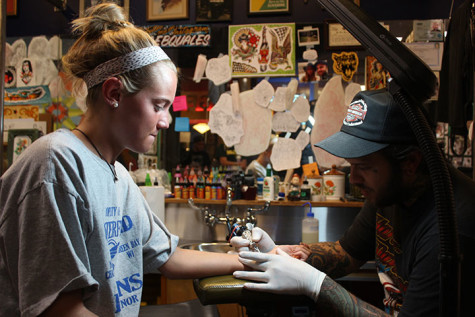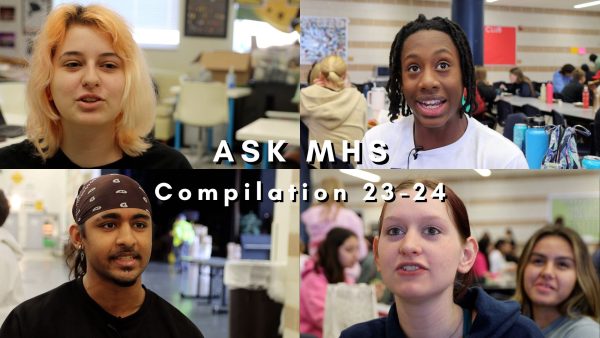Inked: Project Semicolon inspires Moore

Megan Moore, senior, gets her first tattoo: a semicolon on her wrist. “The purpose of the semicolon as the symbol is that it is a punctuation mark, but it doesn’t end a sentence,” Moore said. “It continues a sentence and leads to another idea.”
“Slut.” “Slut.” “Slut.”
It was everywhere: her driveway and her car. She walked out to the parking lot after school to see the principals washing it off her vehicle. A timeline of boys that she had been with was scrawled across the side of her car. It was Homecoming week of 2014, and it was the worst time of senior Megan Moore’s life.
“As time went on, I just became more self loathing and I think the more things are said about you, the more you believe them and start to make them true,” Moore said. “When you feel like the entire school is talking about you, it gets kind of bad.”
But that was just the beginning. Moore has been battling depression for the past year. In January, she started cutting, and her anxiety only escalated from there. She couldn’t concentrate in class. She sweat through shirts. She retreated into her studies.
“Things got a lot worse whenever I would get in my own head,” Moore said. “Night was the worst. Walking through the hallways at night. Those are the worst times.”
In the spring, she attempted to take her own life and then was admitted to the hospital. When she returned from the hospital, she started therapy.
Although she still sees her psychiatrist for medication, Moore said she no longer needs a therapist. She’s not completely better, but now there are a lot more good days than bad ones.
The Semicolon
Moore spent the Friday of Labor Day Weekend getting her first tattoo: a semicolon on her wrist, where she used to cut, to symbolize the progress she has and will continue to make.
“The sentence could have ended there, but it didn’t,” Moore said. “Your life still goes on, and you’re still writing your story.”
Project Semicolon, a faith-based nonprofit organization, strives to spread hope and love to those struggling with mental illness and suicide.
Moore first came into contact with Project Semicolon through Facebook.
“Yes, it is permanent but so are my scars,” Moore said. “I wanted something permanent that is positive and encouraging and hopeful. To remind myself how far I’ve come.”
The Movement
Amy Bleuel, founder of Project Semicolon, began the movement in the spring of 2013 to honor her father whom she lost to suicide. The project started by asking people to draw semicolons on their wrists to promote suicide prevention. Supporters chose to mark their bodies permanently with tattoos as the project evolved.
Many who struggle with suicidal thoughts, depression, addiction or self-injury find the semicolon evokes the essence of their goal: this is not the end but a new beginning.
Project Semicolon supporters aim to be sources of inspirations for others who are struggling. They hope to decrease suicide rates throughout the world and start an open conversation about suicide prevention.
Dennis Adam, tattoo artist at Enigma Tattoos in the Delmar Loop, said he sees at least a couple people a day who get a semicolon tattoo, usually on their wrist, ankle, or behind their ear.
It’s mostly first-time, college-aged female clients who are getting the semicolon, Adam said. Most stick with the simple semicolon, but as the movement has gained popularity, more people have incorporated the semicolon into more intricate designs.
“I think it’s great, not just in the business sense but as someone who has a sister who suffers from mental illness and depression,” Adam said. “Sometimes, I feel cynical and I want to throw out words like ‘trendy’, but anything that’s going to bring awareness to whatever is at hand, it’s wonderful.”
The Recovery
Moore said her family has been incredibly supportive through her entire journey, and she’s become a lot closer with them over the past year. It helped her move forward with her relationship with her mother and with her life.
Mental illness is something no one really likes to talk about, Moore said. If a person has not experienced mental illness first hand, it is often incredibly difficult for him or her to understand.
“You just feel like you’re drowning all the time,” Moore said.
Moore said she thought she could never be happy again, but she was wrong. She wants others struggling to know it gets better.
“You will start to laugh more eventually,” Moore said. “It’s not going to last forever. Just keep pushing forward and get the support you need because going through it by yourself is not going to get you anywhere.”
Your donation will support the student journalists of Marquette High School. Your contribution will allow us to purchase equipment and cover our annual website hosting costs. You may become a PATRON by making a donation at one of these levels: White/$30, Green/$50, Blue/$100. Patron names will be published in the print newsmagazine, on the website and once per quarter on our social media accounts.

Rachel Schibler, senior, is the news editor of the Marquette Messenger. She plays lacrosse and coaches gymnastics. In her free time she enjoys making...







